Cats can be the agents of quiet revenge. Perhaps poetic justice is more appropriate. Either way, it began when the late model white Lincoln Town Car Signature Series slowly cruised up our potholed ranch lane after crossing the bridge over the swollen snowmelt torrent of Agency Creek. It had been raining, and the road was mud. I leaned on my shovel, watching the car slowly negotiate the slalom course of puddles, evidently taking great care not to splash slop up on the pristine paint of the big car. It was 1995, in the sunset era of big luxury cars that resembled ocean liners. They were still owned by very well-to-do ranchers and members of the local elite: the doctors and lawyers of these scattered Rocky Mountain communities.
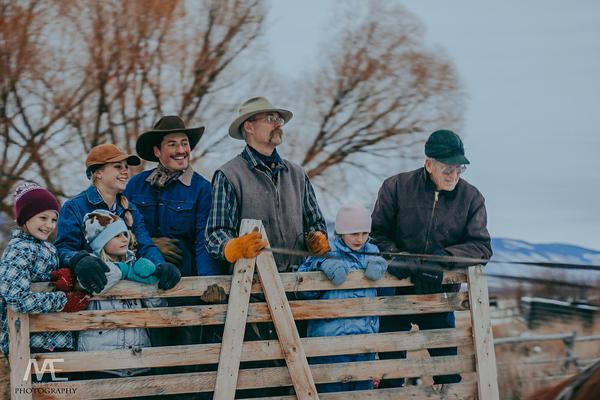
I had been expecting them. This car, I already knew, was being piloted by an attorney. With him was a neighbor who managed the largest ranch in the Lemhi Valley owned by wealthy outside interests, and an 80 something old gentleman, Ralston P. Adams, former owner of the ranch just down the creek from Alderspring. They had come to dispute my use of creek water that I used to flood irrigate my hay meadows. The very shovel I was leaning on, and the irrigation waders I wore on my feet stood as a testament to my current activity: I had been spreading some of the abundant snowmelt waters shed from the Continental Divide by the sun of this spring day. It was an art used since ancient times in rain shadow valleys throughout the world: take some of the sustained flow of snowmelt, and by small ditches and shovel, spread it over lands to water pastures and crops.
The car rolled to a stop, and the gentlemen stepped out. Ralston walked up to me first. We were friends; I had known him for a fair number of years. He shook my hand, pulled off his sunglasses, tilted back his cowboy hat fixture on his head, and quietly said “I’m so sorry, pardner. There’s nothing I could do.”
The lawyer didn’t take off his sunglasses. Nor did my neighbor. They exchanged the surface pleasantries of handshake and greeting with me, and set right to business. The attorney began. “Glenn, it seems you have a misunderstanding about how these water rights in Agency Creek work. You’ve been using water on your higher hay meadows based on your assumption that Claude Alder, the previous land owner to you, placed a ditch to carry that water there when he claimed the water in 1931.” He paused to give me a chance to dispute his statement.
Instead, I nodded in agreement. “That’s correct”¦except for the misunderstanding part.” Water use in the Western States is governed by a very clear series of laws, dating back to over 100 years prior in these mountain valleys. Use was allowed only by bonafide water rights holders, backed up by a decree the state appropriated after filing on a claim for water. The first who claim get priority. Claude had made and filed a claim, and the State approved it, back in 1931.
The attorney continued: “We have here with us a witness, Ralston Adams, who is willing to testify that the ditch you are using was not in place until after 1946.” Out of the corner of my eye, I saw Ralston sadly nodding his head.
“It’s true, pardner. I remember when Claude dug that ditch. It was after I moved here, in ’46.” The dispute was in the fact that these guys believed the ditch went in long after the claim, and Claude’s and our use of it was bogus.
My ranch manager neighbor rudely cut in with his two cents: “And that’s why you can’t irrigate anymore up on your hay meadows there. We’re gonna shut you down from yer water stealin’. Once and for all. Yer just like your predecessor. That Claude Alder. Short little shrimpy water stealin’ sonofabitch.”
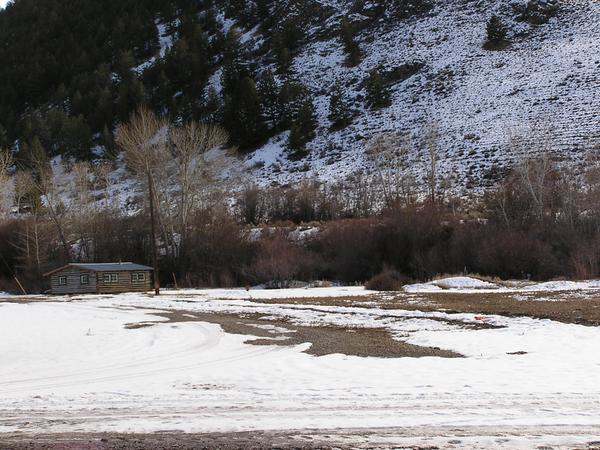
Now my cussing neighbor did have priority use of that water by date. So he could claim my water if there was limited flow in the creek. But if there was extra, like there was now, I could use it. The creek was overflowing banks, and most of the water was going to end up in the Pacific. I wasn’t illegal in my use; there was plenty of water to go around. Their problem with me was where I was using it.
Ralston started again, now pointing to where Claude cut that ditch open and how he remembered it clear as day. I let him say his piece, and listened. Ralston was quite a gifted yarn spinner. I smiled as he spoke. He spoke with color and clarity, bringing us back to the time and place, just how he saw it.
The lawyer took off his sunglasses and waved them at Ralston, cutting him off from continuing his colorful tale of ditch and dirt. “So, Glenn, we’re going to have to file legal action against you if you continue to use that high ditch for water conveyance to your fields.”
“Yeah,” Said my big ranch manager neighbor. He folded his arms. “And you won’t be able to steal no more.”
“Is that it?” I asked. “Any other evidence beside Ralston’s testimony?”
They collectively shook their heads. Ralston shook his the slowest. “No, Glenn. No other evidence,” said the attorney. “So you’ll cease and desist use of the ditch?”
“Can I present something?” I asked.
“Yes,” said the attorney.
I reached behind my back, under my torn and weather beaten Carhartt coat. I watched their widening eyes with an interested grin: many folks in our parts packed pistols where I was reaching, and the three of them were obviously unarmed. I produced a manila envelope instead, and shook out a yellowing aerial photograph. A week before, I found and pulled it out of files buried deep at the local BLM office to prepare for this very meeting. Thankfully, they let me borrow it. It was a black and white photo taken by the government in 1929. I remembered seeing this series of flight photos when I used to work as the forester for the agency.
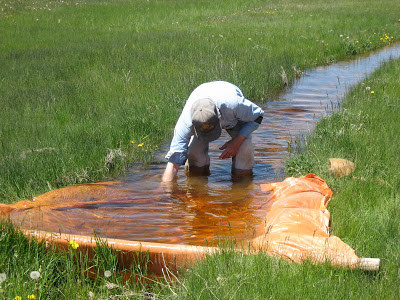
“This here’s an aerial photo from the BLM files. It’s dated 1929.” I pointed to the date in the upper right-hand corner. It was obviously embossed in the film of the photograph, as were all aerials for the 70 years when the science of aerial photogrammetry was at its peak. It was one of those few times I was grateful for the college courses I took in Land Surveying and Aerial Photo Interpretation.
I firmly held the old black and white piece of yellowing photographic paper in my hand, despite their attempt to take it in theirs. “It clearly shows the ditch in question. Not only was it in place when Claude filed on his water in 1931, it was here before then.” I looked at Ralston. “I’m sorry pardner. You must be recalling a time when Claude was cleaning the ditch, not when he was building it. Either way, he would have had a dozer in the ditch.” I smiled at my speechless companions.
I carefully slid the photograph back into the manila envelope, placed it back in the small of my back under my belt, and reached out my hand in a farewell handshake to each of the men.
“Thank you for your time, Gentlemen. Anything else?” The lawyer slowly shook his head. I lifted shovel on shoulder and headed off to further exercise my art of spreading water. As I passed the Lincoln, I noticed that the attorney had left his driver’s side window open. When something moved in the back seat on the white leather upholstery, it caught my eye. It was Larry, the kitty brother of Moe and Curly lovingly named by my girls. They were the tabby cat trio. Larry always did like cars. I noticed something else about the car as he happily jumped out to accompany me, purring, off to the field to find mice.
I continued walking away from the men. I could hear them still mumbling to each other. I spun around to project my voice as I walked backward. “Oh, and, well, if you do come back again, you might want to close your windows before you get out.” I nodded to Larry, walking his little proud and mincing gait, tail held high. “He does like cars, you know.”
The trio stared at me, again speechless, as they walked to their car. I wheeled around again, still smiling, now longstriding my way out into the green field, abloom with wildflowers and lush growing and tender grass. I put lawyer and neighbor behind me, and kept them there. Even though I really wanted to, I never looked back; I had water to spread.
Larry was very un-catlike in his cleanliness. He often tracked mud into our home, as he had done on nearly every flat surface of immaculate white leather in that Lincoln Town Car Signature Series Edition.
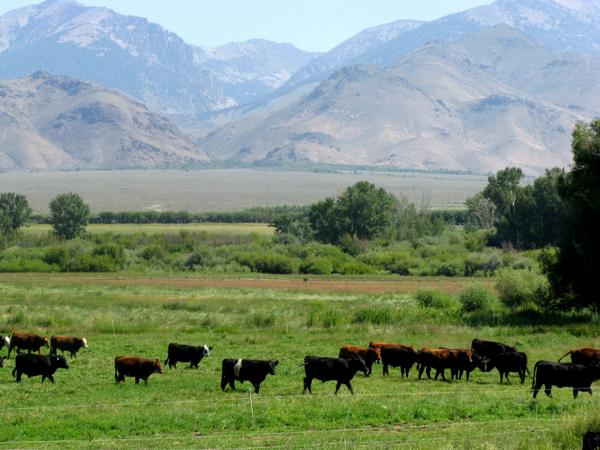
“Whiskey is for drinking; water is for fighting over.” Allegedly, this quote was made by Mark Twain as he quipped about disputes over water use in the West. To some degree, it has proven true, even in my experience. When we first came to the high Pahsimeroi Valley, we were strangers. I recall one week where my ditch water slowed to a trickle. Following the thread upstream, I found that my neighbor had come on our place at night with his Case Construction King backhoe and filled our ditches in with dirt. I dug them out.
On the other side of Alderspring, neighbor Billy repeatedly whacked his neighbor over the head with a shovel when he caught him stealing water by cover of darkness. The thieving neighbor was out cold for several hours and when he woke was apparently cured of any further desire to abscond with high Pahsimeroi snowmelt from Billy’s ditch.
And it isn’t only water. Grass is regularly stolen from Alderspring. “Good fences make good neighbors,” goes the quote. I guess that means the opposite about bad fences. Just over the last year, I estimate that we lost nearly $1500 in grass. Yes, grass is worth that much in world where grass means grazing and grazing means pounds of beef. There’s of 30,000 head of cattle in our country, almost 10 times the amount of people, and they need grass. In the worst years, that figure can exceed $5K. When you have 55 miles of fence to maintain, it’s hard to cover it all every year. Instead, you get horseback, gather and move the neighbor’s cattle over several days, and fix the fence.
Cattle themselves often get rustled (that’s the cowboy word for stolen). We’ve occasionally lost cattle to rustling throughout our ranching career of 25 years. Cows and steers magically disappear from rented ground. Spontaneous combustion perhaps, but I think not.
Weather is always there as something to contend with on a ranch. But humans, especially when left in remote country to their own devices, can go wrongly awry. I think we all need accountability, and if all you have is your dog to keep you accountable, well he’s probably thinking of his own crimes to commit. So when there’s no-one to answer to, thinking can run amok.
Like the weather, you always keep the possibilities of human weakness in the back of your mind. You lock your bulk fuel tanks. You keep your best saddle in your house. We don’t let it get to us. I don’t think people are worse than they used to be. In fact, I find that people are still good, for the most part. I can’t tell you how many times a neighbor called from 40 miles away with a few of our cows in their corral. I remember one time a gentleman in Montana called me. He took the time to look our Idaho eartag mark up. He was almost two hours away. He had one steer of ours in his corral after gathering 1200 head of his own cows from the range. It would have been so easy to just load him up with the rest of his cattle-bound for an Iowa feedlot.
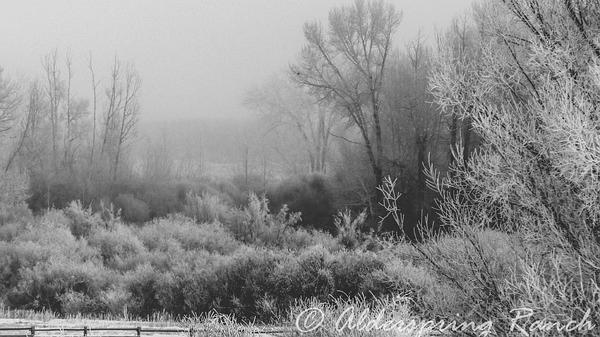 And then there are neighbors who will mend a piece of that forever 50 mile fence. I’ll ride up on my buckskin to mend a section I know is busted, and they’ve already got it. We lose 25 pairs of Angus moms and calves, swept down the river in the flow and surge of Salmon River snowmelt; they get in with my neighbors over miles of trackless wilderness, and sure enough, 5 months later, they call. They have them all gathered in October, in a corral 62 miles away. We go get them. I could write a whole story on just the acts of goodwill that other folks have done for us, with no expectation of payback.
And then there are neighbors who will mend a piece of that forever 50 mile fence. I’ll ride up on my buckskin to mend a section I know is busted, and they’ve already got it. We lose 25 pairs of Angus moms and calves, swept down the river in the flow and surge of Salmon River snowmelt; they get in with my neighbors over miles of trackless wilderness, and sure enough, 5 months later, they call. They have them all gathered in October, in a corral 62 miles away. We go get them. I could write a whole story on just the acts of goodwill that other folks have done for us, with no expectation of payback.
And it gives you faith in humanity, that despite the occasional so-called sonofabitches, there is still good out there. And so, it isn’t only the regeneration of the land that we are witness to that gives us hope; so do the humans we share our livelihood with. And that includes you, our partners. It sure makes it easier to spring out of bed in the morning, when there are these simple gifts of good land and people that we work with. I look forward to see what the next thing is. Maybe it’s just a card of thanks, or a kind email.
Or a handshake and a story at the feed store.
Life’s an adventure full of good people and good things that can bring a smile, if we’re paying attention. Kinda like seeing cat prints on white leather.
Happy Trails.
Glenn, Caryl, Cowboys and Girls at Alderspring

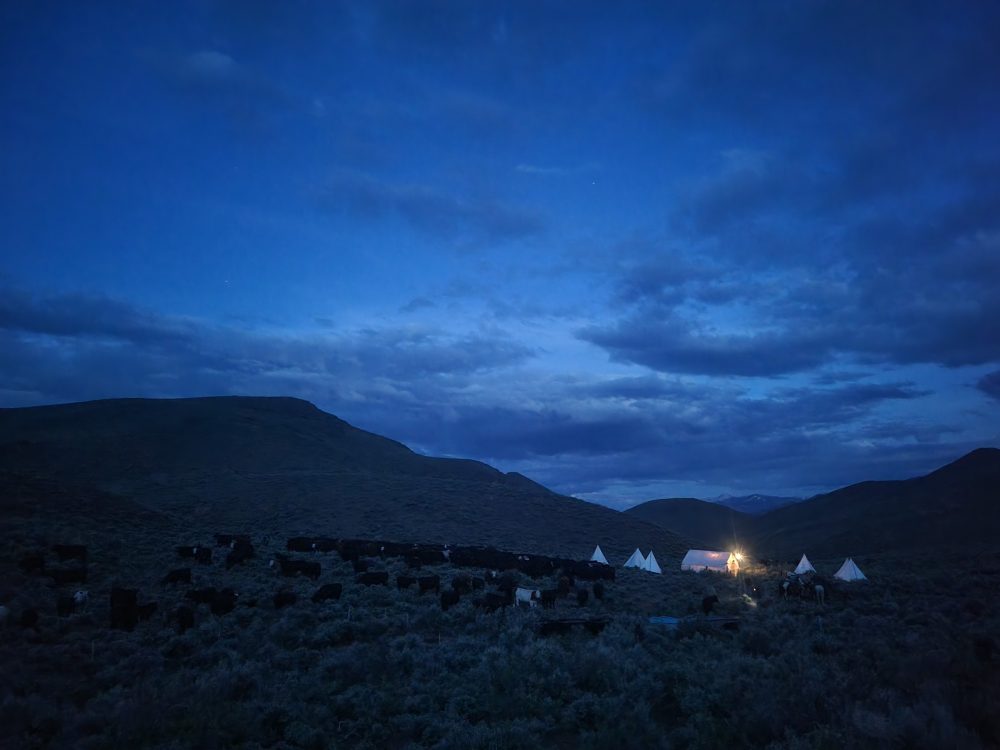

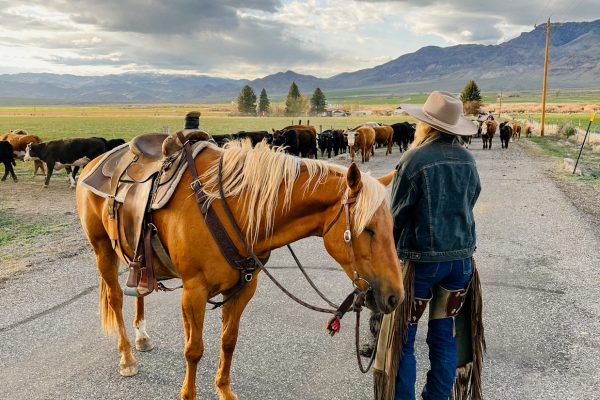

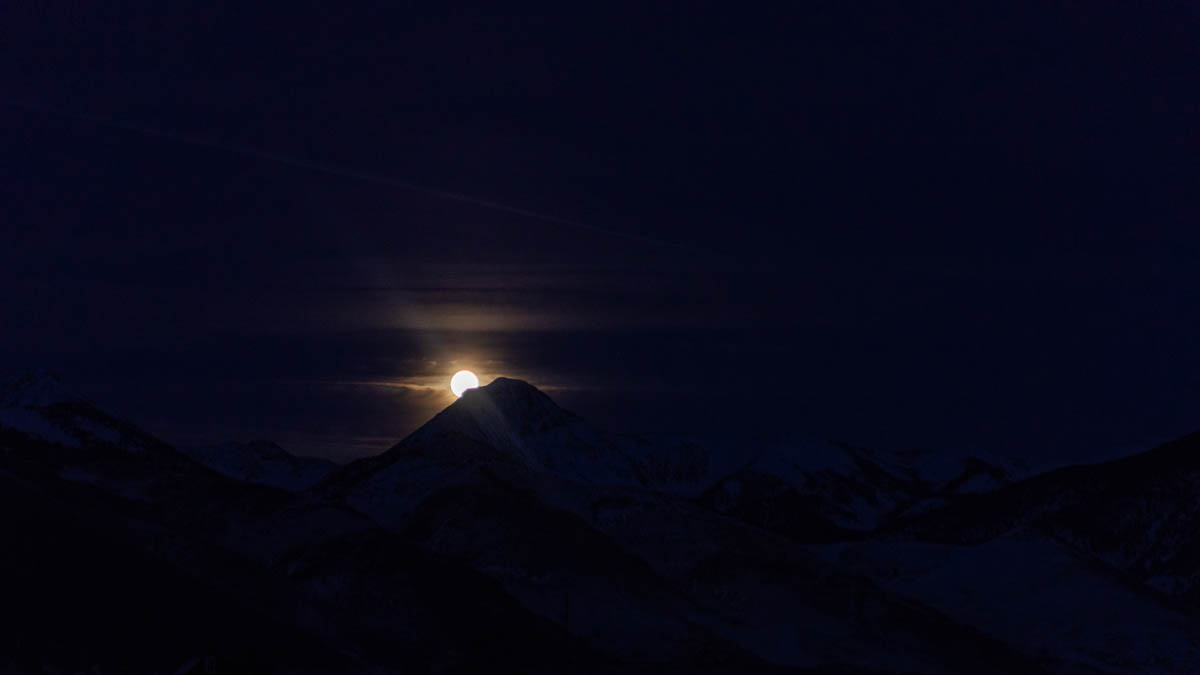
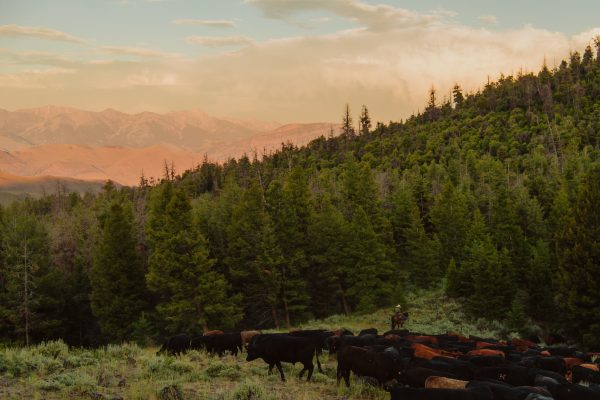
Leave a Reply